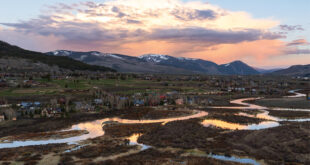It’s not easy participating in democracy. It can be messy, it can be controversial, it can lose you friends or help you find common ground. That’s the system.
In a democracy you can complain and do nothing, or you can step up, stake out a position, suggest a solution to a problem and maybe succeed or fail with your effort. But democracy requires participation, conversation, debate and most likely compromise. Solutions are not discovered under a shroud of secrecy. In fact, anonymity encourages stridency, polarization and a lack of civility. With anonymity, there is no reason to remain polite and reasoned since you could be throwing rocks at your neighbor and they wouldn’t know. If you understand that you’ll be seeing the person who is on the other side of an issue at the post office or grocery, you are more likely to be respectful. Good democracy is a team sport that can at times be tense and uncomfortable.
The CB News, along with the Gunnison County Library District, has been in the Colorado court system arguing that anonymity is no friend of a functioning democracy.
The News and the Library District have asked the state courts to not allow people to anonymously advocate for the banning of books in public libraries. The courts have ruled against us so far as they interpret the section of a Colorado statute that states, “…a publicly supported library shall not disclose any record or other information that identifies a person as having requested or obtained specific materials or service or as otherwise having used the library,” as meaning that it applies to people who fill out a form requesting a policy change for the library that would impact the entire library community. We both argued that such attempts do not make someone a “user” of the community library or that they are obtaining a “service.” In fact, we see them as working to prohibit others from using library services…it’s actually an anti-use.
The News and Library District strongly defend the idea of not releasing a person’s name because of the books they read. We agree, for example, that the police should not be able to access your library records showing what materials you checked out. The government should not snoop around and see who is taking out pro-Trump books or anti-Biden articles. That’s too much Big Brother.
The focus at the Colorado Court of Appeals has been that a community is not served by anonymous people pushing to change policies of a public institution like a library without saying who they are and where they are from. That transparent governance is necessary for the operation of the library. The courts thus far have focused on the legislative wording (the latest opinion dives deep into the words “service” and “or”) despite our arguments that included the intent of the law when it was passed based on supporting standards and documentation. The Library District has pointed out that the operation of the library requires a public process. After all, a public board owns the books. How can they operate without transparency?
In the Colorado Court of Appeals opinion, two of the three appellate judges on the panel stated that, “We perceive no persuasive argument that … the public good would be enhanced by revealing the identity of the requesters.” I cannot disagree more. The public good would not just be enhanced by knowing who is trying to prohibit you and me from checking out certain books, but it seems the “public good” is damaged tremendously if those requesting a change in public policy in a public institution are allowed to do so in secret.
The public has every right and, in fact, a need to know who or what organizations are working to disrupt the policies of a community’s public institutions. The public—you—should be entitled to know whether the person pushing to ban or relocate a book in our library is an elected official or library board member, a minimum wager toiling at a conservative think tank in Alabama that is filing 15 such requests every day, or an intern going through a list of libraries and filing reconsideration forms across the country out of a liberal think tank in Berkeley, California.
Funny anonymity story: The CB News received a short, unsigned email this weekend criticizing me as a “non-journalist” that any “unbiased publication” would be better off without since I was pursuing a “witch hunt” in the court effort.
I politely responded and asked if the emailer wanted to run their thoughts as a letter to the editor, and if so, to send their name as a signatory to the letter. We don’t print unsigned, anonymous letters. I received no response. Having done this so long, I spent only a few hours weeping in my bed trying to soothe my hurt feelings.
Look, opinions different than mine are certainly valid. We at the News run pretty much any signed letter that doesn’t include personal attacks on people other than me. I’ve changed my mind on some issues after hearing arguments that I hadn’t considered previously. That’s the way democracy works…. sign your name, stand up in public, make your case to the community and use the power of persuasion to institute change instead of anonymous bullying.
I’ve read several of the prominent books people complain about like Gender Queer and admit there are parts that make me uncomfortable, so I understand the desire by some to put restrictions on them (and there are restrictions in Gunnison County by the way). Why and where those books belong in our community can be part of a legitimate public discussion. But public is the key word in this instance. There is no doubt in my mind that to answer the appellate court judges, the “public good” would definitely be enhanced by revealing the identity of those anonymous requesters doing work in the shadows that impacts this community. Allowing anonymity is simply not beneficial to a robust democratic process.
—Mark Reaman (non-journalist)
 The Crested Butte News Serving the Gunnison Valley since 1999
The Crested Butte News Serving the Gunnison Valley since 1999






